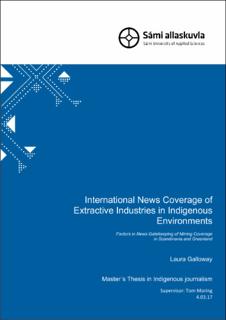International News Coverage of Extractive Industries in Indigenous Environments: Factors in News Gatekeeping of Mining Coverage in Scandinavia and Greenland
Master thesis
Published version
Permanent lenke
https://hdl.handle.net/11250/2789076Utgivelsesdato
2017Metadata
Vis full innførselSamlinger
Sammendrag
Extractive resources derived by the global mining industry are critical to modern existence. Without iron ore, bridges, tunnels, skyscrapers, mass agricultural equipment, telecommunications infrastructure, and transportation – from the shipping and aerospace industries to motor vehicles – would not be possible. Uranium is essential for nuclear energy and nuclear weapons, the most powerful tool of war known to man. Copper, iron ore, nickel, and rare earth minerals are vital to modern society, technology, and communications. Frequently, extractive resources exist in Indigenous lands. Extraction disproportionately affects Indigenous people, due to their connection to the natural environment and traditional livelihoods that rely on the natural world. Yet despite these substantial environmental and cultural implications, the issue of mining and Indigenous people inconsistently makes it on the global news agenda. This thesis explores and deconstructs the possible reasons for this phenomena through specific examination of news gatekeeping, based on qualitative interviews with former and current news editors of the BBC and Washington Post, and as seen in the context of international coverage of mining activity in Sweden and Norway, two central areas of the Indigenous Sámi people, and Greenland, home of the Inuk Inuit. This thesis reveals how multiple News Values, newsroom economics, source crediblilty, and access to Indigneous perspectives and journalists influence coverage decisions.
